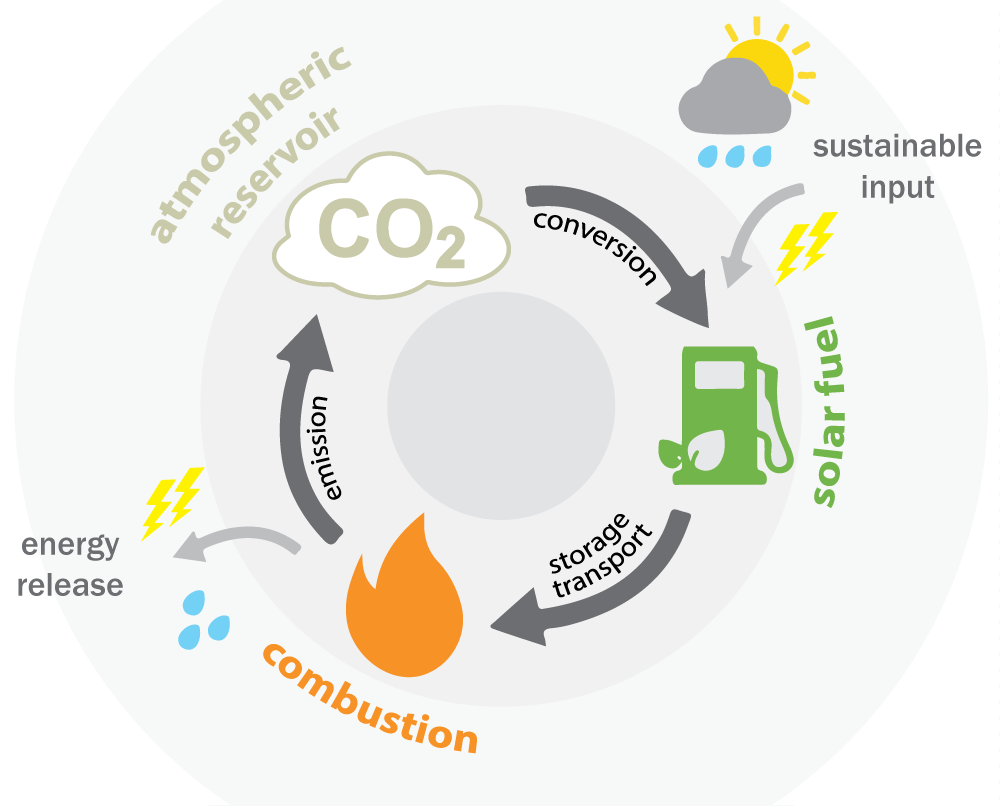The worldwide energy transition from fossil fuels to sustainable energy requires technology with which energy can be efficiently stored and transported. Our research into solar fuels addresses the global challenge of efficiently converting and storing sustainable energy into chemicals. These offer the highest energy densities and are ideal for long-term storage and long-distance transport of sustainable energy.

In particular, DIFFER investigates the splitting of water (with sustainable electricity from for example sun or wind power) into hydrogen and oxygen using electricity and the reduction of carbon dioxide (CO2) to carbon monoxide, as an important starting point for the synthesis of CO2-neutral chemical fuels. Our research involves the synthesis and design of novel materials and processes to obtain scalable, efficient and cost-effective systems.
Want to learn more about Solar Fuels?
Check out our dossier on Solar Fuels (in Dutch), published in November 2018 as a special issue of NTvN, the Dutch Physics Journal:
- Het hoe, wat en waarom van zonnebrandstoffen
- Waterstof direct van de zon
- Zonnebrandstoffen uit plasmolyse
Physics website Natuurkunde.nl covered our Solar Fuels research:
- Een vliegtuig op zonnebrandstof, kan dat?
- Clip about our solar fuels research (YouTube, English with Dutch subtitles)
Research groups
Autonomous Energy Materials Discovery
Applying fundamental physical laws and modern data science tools to model, and more ambitiously, to discover new materials for energy conversion and storage - group leader: Dr. Süleyman Er
Catalytic and Electrochemical Processes for Energy Applications
Combining solid state electrochemistry with (photo)catalysis to improve the efficiency of existing and to develop new routes for energy storage - group leader: Dr. Mihalis Tsampas
Electrochemical Materials and Interfaces
Understanding and tuning the properties of electrochemical materials and interfaces to reach highest performance and to supply alternative, sustainable energy solutions for the future - group leader: Dr. Anja Bieberle
Plasma Solar Fuels Devices
Gaining efficient production of high energy density fuels or intermediates such as carbon monoxide and hydrogen gas by plasma assisted conversion - group leader: Prof.Dr.Ir. Richard van de Sanden
Former Research
Former research activities within the Solar Fuels department are listed with names of respective group leaders.
- Atmospheric Plasma Processing of Functional Films
Investigating atmospheric plasma processes for large scale synthesis of advanced functional thin films for CO2 neutral solutions. This group completed its programme in 2018. - group leader: Dr. Hindrik de Vries - Computational Plasma Physics and Chemistry
Developing numerical models for the study of molecular plasmas - group leader: Dr. Paola Diomede - Nanomaterials for Energy Applications
Exploring fundamental challenges and application opportunities of nanomaterials for energy conversion and storage - group leader: Dr. Andrea Baldi - Nonequilibrium Fuel Conversion
Fundamental understanding of plasma chemical dissociation of CO2 for the development of a generic plasma chemical route as the first step in CO2-neutral fuel production - group leader: Prof.Dr. Gerard van Rooij - Photonics for Energy
Investigation light-matter interaction in a broad range of frequencies to contribute energy conversion. As of 1 September 2018, this group has become part of TU/e - group leader: Prof.Dr. Jaime Gómez-Rivas